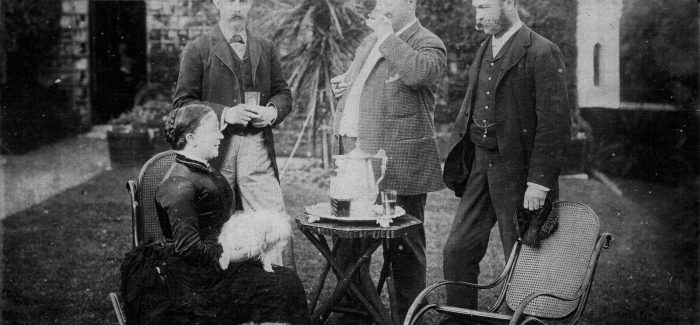The Rise and Fall of Francis DuBedat
We would like to thank Anna and Colin Scudds for allowing us to reproduce below the article which appeared in the Dun Laoghaire Borough Historical Society Journal No. 6 1997.
Foreword
This meticulously researched study of the Dublin Huguenot family of Du Bedat is a fascinating portrayal of the real history behind the name immortalised by George Bernard Shaw in The Doctor’s Dilemma. The name Du Bedat is frequently found in Dublin Huguenot records and several family headstones are preserved in the recently restored Huguenot Cemetery in Merrion Row, Dublin. My own ancestor, Pierre Abercrombie Le Clerc, married Jane Du Bedat in 1779. Ms Glancy traces the family’s noble origins in France, establishment in Dublin, rise to prominence throughout the 18th and 19th centuries and eventual tragic eclipse.
Secretary, Irish Section of the Huguenot Society
Vivien Le Clerc Costello
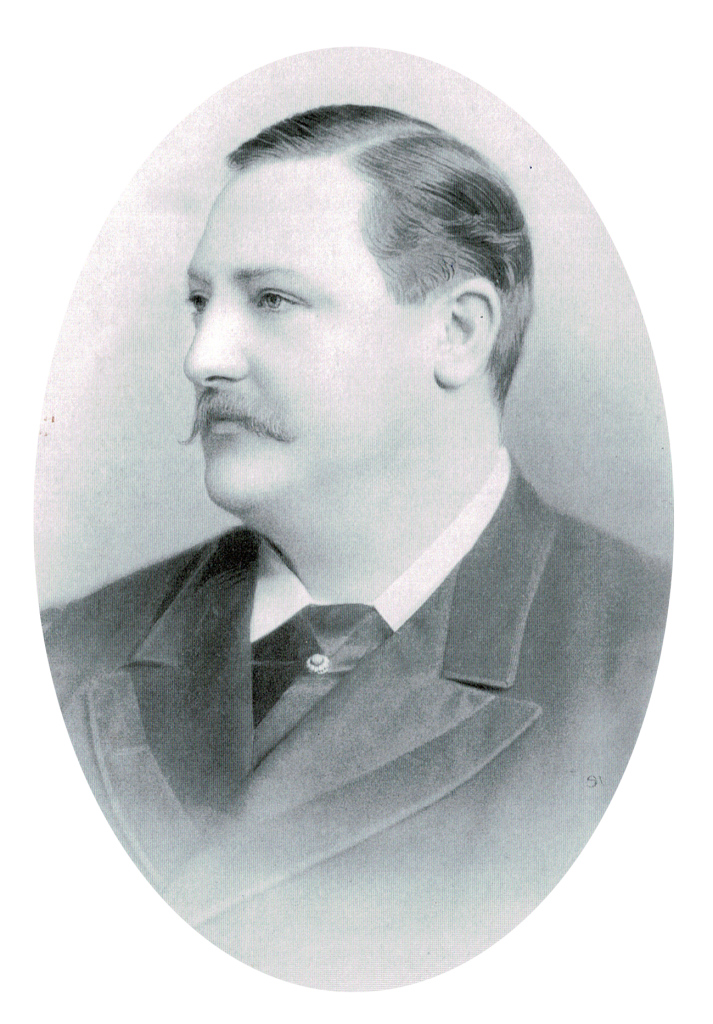
The DuBedats of Dublin
This is the story of a family who over a period of 150 years rose to be one of the foremost powers in Dublin’s financial and social circles but lost it all by the misdeeds of one member, namely Frank Edward DuBedat. Frank’s crime was fraud. In 1890, at the age of 40, he was President of the Dublin Stock Exchange and had inherited a position of trust in his father’s firm William George DuBedat & Sons, Government Stock and Share Brokers. His motivation was not quite one of greed but rather one of ambition, in which he saw himself as the head of a large and illustrious family. His dream was a mansion on the hill, it was also his downfall. This great tragedy occurred over the Christmas of 1890 and within a few years the family name had died out in Ireland. Many of Frank’s relations emigrated to pastures new, others changed their surname, including his own son. There are no photographs or portraits remaining, only tombstone inscriptions show that they once existed. A veil of secrecy reigns over his descendants today, all loyal to the wishes of ancestors who lived through the period of this tragic downfall. This brief history is dedicated to those DuBedats whose remains lie in the Huguenot cemetery in Merrion Row, Dublin, so that their memory will not be forgotten.
Origins of Family
The Huguenot family of DuBedat originally came from Agen in the province of Guienne, France. The first recorded in Dublin — Jean, born 1716 at Lacepede, France was a son or grandson of Mathieu DuBedat, Advocate in the Parliament of Paris, whose draft Memorial to Louis XIV, on behalf of the French Protestants, was once housed in the RDS Library. Jean founded the first sugar refinery in Ireland, carrying on his business at Chequer Lane, later known as Exchequer Street. He married Ann Baque in 1741. They were non-conformist and attended Peter Street church. Jean died in 1780 and Ann in 1798. They are both buried in the Huguenot Cemetery, Merrion Row.
The Tardy Connection
Ann DuBedat, daughter of Jean, married Elias Tardy in 1773. Elias had served in the French navy before settling in Dublin as a Sugar Baker in 1766. He became an elder of the French Church in Peter Street. Ann died in 1786 and Elias then married Alice, widow of John Chaigneau. The Tardys and the DuBedats were to remain very close friends right up to the end of the 19th century.
Family Connections
Other marriages during this early period were: Jane DuBedat to Peter Abercrombie Le Clerc in 1779 and Peter DuBedat to Margaret Cocksedge in 1781. This Peter was the father of William DuBedat, Transfer Officer of the Bank of Ireland, who was born in 1785. He married Mary Alley in 1809 and settled in Sandymount. Sandymount was to become the home of several DuBedat families over the next 50 years. William died in 1857 and was buried in the family grave at Merrion Row, as was his widow Mary when she died in 1876. The following index to Marriages 1800 to 1858 shows the various family names connected with the name DuBedat:
DuBedat: Charlotte & Charles Blackwell, 1835
DuBedat: Emily & Frederick McCullagh, 1834
DuBedat: Frances A & George V. Du Noyer, 1857
DuBedat: Francis & Frances Porter, 1842
DuBedat: Henry & Georgina M. Woodroffe, 1854
DuBedat: John & Catherine Sophia Gray, 1856
DuBedat: Margaret J. & Daniel Kinahan Smyth, 1834
DuBedat: Mary Ann & William Parks, 1820
DuBedat: Mary L. & Charles Stuart, Jnr., 1832
DuBedat: Peter & Louisa Mary Simpson, 1833
DuBedat: Robert & Charlotte Dunoyer, 1848
DuBedat: William & Mary Alley, 1809
DuBedat: William G. & Anne Letitia Copperthwaite, 1843
DuBedat: Margaret & Louis Du Noyer, 1816
By 1850 the DuBedats were well established in the banking and stockbroking scene in Dublin. John DuBedat was carrying on business as a stockbroker with John Porter in Dame Street and the company of Smyth & DuBedat, Stock & Share Brokers, were in business at Commercial Buildings, Dame Street.
William & Mary DuBedat
William, Transfer Officer of the Bank of Ireland, and his wife Mary had several sons including: Peter, born 1812; William George, born 1815; John, born 1819; Francis, born 1821; Robert, born 1823 and Henry, year of birth unknown. They were all buried in the family plot at Merrion Row. Peter married Louisa Mary Simpson in 1833 and they had two daughters. He was Secretary of the Bank of Ireland from 1858 to 1882 and apart from his own private house had a residence above the bank at Westmoreland Street. He died in 1887 at his home in Seaview Terrace, Donnybrook. John married Catherine Sophia Gray and was a Stockbroker in Dame Street. Francis married Frances Porter, daughter of a prominent Dublin Stock Broker, John Porter, but died at the early age of 36. Robert married Charlotte Du Noyer in 1848 and lived at Sandymount Green. He was a Merchant with a business address at Harcourt Mills, Golden Bridge. Henry was living at 82, Leeson Street Upper in 1860 and carrying on business as a Stock and Share Broker in Fleet Street.
William George DuBedat
William George, second son of William and Mary, married Anne Letitia, daughter of Thomas Copperthwaite of Dublin City, in 1843, and it is their line that the remainder of this story follows. They had several children: Thomas, born 1843, who died in infancy; Martha Mary, born 1845; Anne Georgina, born 1846; Mary Louisa, born 1847; William Copperthwaite, born 1850 and Francis Edward, born 1851. Charles John may have been another son. During this period of their marriage the family were living in the Donnybrook area. William George was in business as a Stockbroker in College Green. When the railway line was extended to Ballybrack in the 1850s the family moved out to Ballybrack House, a Georgian mansion on approximately two acres, with spectacular views of the sea with Bray in the distance. William George acted on the panel of Town Commissioners for Killiney alongside Samuel S. Waterhouse, whose eldest daughter Mary Rosa would eventually marry his second eldest son Francis Edward. Another member on the panel at this time was Stockbroker Robert Exham. In 1871 William George moved his business to new premises at 1 & 2 Foster Place beside the Bank of Ireland, where his brother Peter was Secretary. Here both his sons William and Frank came into the family firm, which was to become known as William George DuBedat & Sons, Government Stock and Share Brokers. It was now nearly a century and a half since the first DuBedat had settled in Ireland and through hard work, solidarity and an aptitude for business, had built up a reputation of honour amongst the highest banking and social circles in Dublin. Twenty years later this inheritance was shattered by the unfortunate dealings of Frank E. DuBedat.
The Waterhouses
Samuel Swinburne Waterhouse was born in England in 1820. His family, Gold and Silver smiths, had branches in both Sheffield and London. In the early 1840s the Waterhouses expanded their business to Ireland, opening at 25 Dame Street, Dublin, where the family were to continue their trade right up to the 1950s. Within a few years they were appointed manufacturing Gold and Silver smiths to his Excellency the Lord Lieutenant. Samuel married Anne Wright around 1845 and settled first in Beggars Bush, before moving to Killiney in 1852, where for a time he lived in Kilmore House. Meanwhile he had purchased Glenalua House, to which he had made various renovations before moving his family in. This was about 1854. Samuel and Anne had six children: Mary Rosa, Thomas Dakin, Howard Alfred, Annie Alma, Emma Dakin and Thomas George. Samuel became a highly respected man in Killiney, attending Holy Trinity Church, serving on the local council and employing many local people. He continued to prosper and acquired many properties in the area.
Francis Edward DuBedat
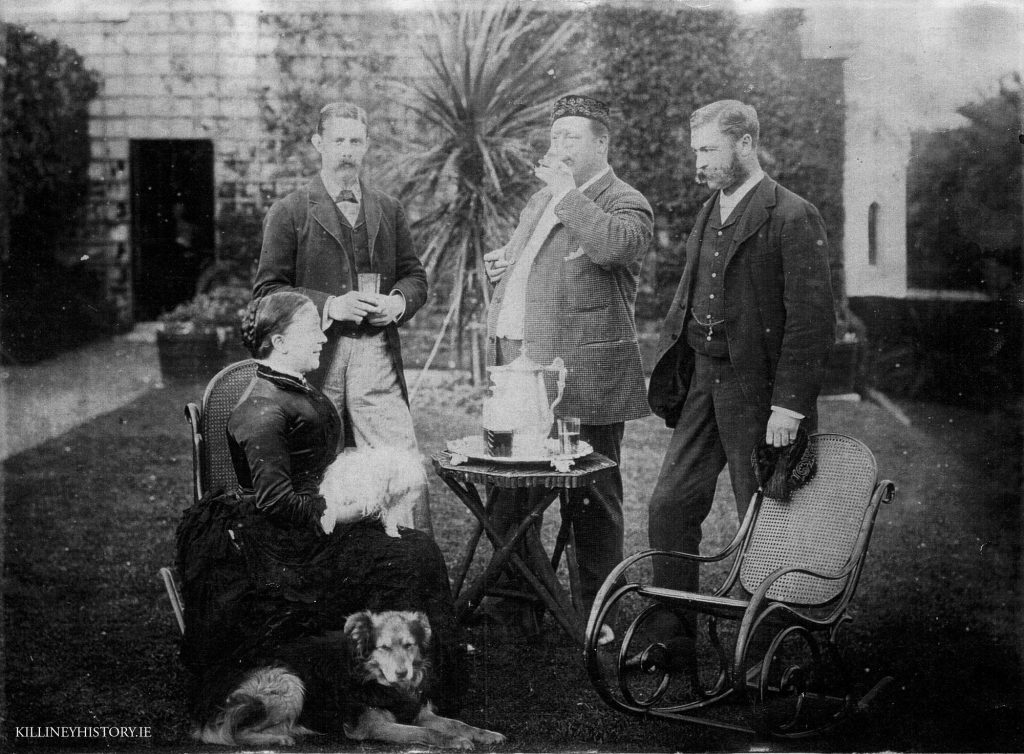
At the age of 20 Francis DuBedat married Mary Rosa, daughter of Samuel Waterhouse. The ceremony was conducted by the Rev. Elias Tardy at Holy Trinity Church, Killiney. The year was 1872, the same year Frank completed his apprenticeship in stockbroking. No doubt it was considered a splendid match by both families. The young couple settled into married life at Glenalua Lodge, Glenalua Road, Killiney, a short distance from Mary Rosa’s family. Their first child, a daughter, was born in 1879. A son and another daughter, born during the 1880s, completed the family. In 1877 Frank’s older brother William died suddenly from epilepsy at his home, 43, Bushfield Avenue. He was only 27 years of age. His father was now in his 60s and Frank began to take on family responsibilities, such as arranging funerals, tombstone inscriptions, looking after the financial affairs of elderly relatives etc. He was a trustee of the French Huguenot Fund from 1874, later acting as Treasurer. Another trustee and friend at this time was James E B. Tardy. These funds were invested in different shares and the dividends used to support the poorer descendants of Huguenot families. Because of the financial reputation the family of DuBedat had built up over three generations, a great many people entrusted their life savings with the firm of William George DuBedat & Sons, now under the complete control of Frank. Many of these people were family and personal friends who fell under the spell of Frank’s reputed charm. He was a very big man in point of size, 5 feet 10 inches tall and 24 stone in weight. He was very popular amongst his business colleagues and a general favourite in the Stock Exchange; in some circles he was known as ‘The Baron’. In 1889, the year his father died, on the recommendation of the Earl of Meath, he was appointed a Justice of the Peace for County Dublin. By 1890 he was at the peak of his power, having been elected, at the age of 40, President of the Dublin Stock Exchange.
Frankfort
In 1889 Frank and Rosie, as they were known to family and friends, acquired from John Brooke the house and lands known as ‘Stoneleigh’, which were situated at the top of St George’s Avenue, Killiney. Frank also acquired land from his father-in-law, Samuel, to enable him to have a private right of way from the Glenalua side solely for his own family’s use and that of their staff. ‘Stoneleigh’ was a mansion built mainly of granite in the early 1870s, with uninterrupted views of Dublin Bay and the Dublin and Wicklow mountains. At one time the Exham family lived there. Part of the estate which consisted of approximately 15 acres, was still leased from them. Frank planned to turn his estate into one of the finest in Killiney. He hired the services of Albert E. Murray, a well-known Irish architect. Albert was the third generation of Murrays, whose association with architecture extended back into the 18th century. A cousin and partner of grandfather William, was Francis Johnson, founder and first President of the Royal Hibernian Academy. The Murrays were associated with designing many Bank buildings, including renovations to the Bank of Ireland when it changed from the Houses of Parliament to a banking office. Albert E. Murray designed the stables and offices, and probably the renovations to the existing house at ‘Stoneleigh’. The original drawings of the stables and offices were displayed at the exhibition of the Royal Hibernian Academy in December, 1891. The house was renamed ‘Frankfort’.
The following description of the house appeared in the newspapers in June 1891:
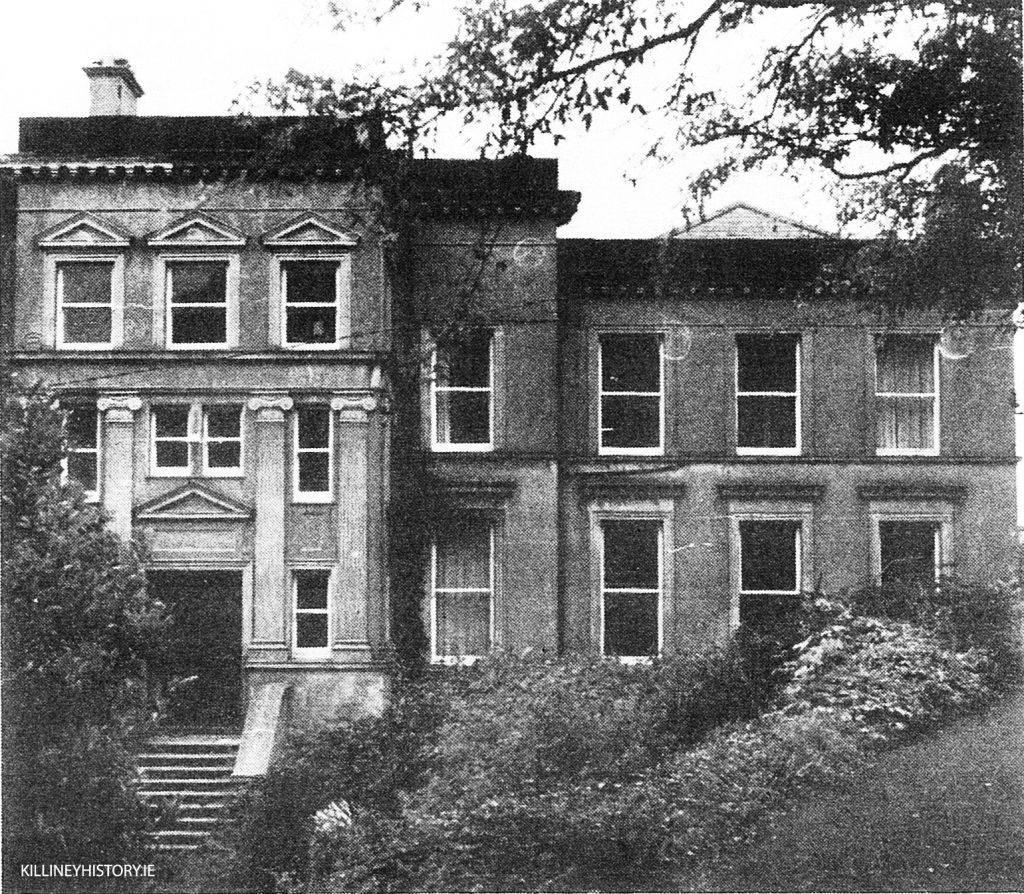
The mansion, now known as Frankfort (formerly ‘Stoneleigh’), occupies one of the most commanding sites in the county Dublin, having uninterrupted views of Dublin Bay and the Wicklow mountains. It is about a quarter of an hour’s walk from the Killiney and Ballybrack railway stations, and is approached by a newly made carriage drive with castellated gate entrance. The avenue, beautifully planted with choice flowering and evergreen shrubs and (is) protected on either side with strong iron fencing wire. There are also gardens, terraces and tennis ground. The residence and out offices, upon which nearly £7,000 has been already spent, are nearly completed, both masonry and carpentry being of the finest possible quality. The accommodation consists of: Seven lofty and well proportioned bedrooms and two dressingrooms with fixed lavatories; drawing, dining, morning, day and billiard rooms; spacious hall with lavatory and cloakroom, three w.c.’s; bathroom, schoolroom, splendidly appointed kitchens, wine cellars, pantries, servants rooms and electric lights and hot and cold water throughout, and the principal rooms are heated with hot water pipes. There is an enclosed yard, with coal houses, fuel rooms and closets. The out-offices, erected on the most modern principle, contain an aviary, stabling for eight horses (Musgrave fittings), harness room, bedrooms for three coachmen, tool and out house, cowhouse with Musgrave fittings for four head of cattle, dairy, laundry, playroom 60ft long, sheds, electric house, large hay shed with corrugated iron roof, lofts for corn and hay.
This house was to reflect the public image of Frank, successful, highly respected, a man of substance. Instead it was to cause his downfall.
Read more about Frankfort (now Kenah Hill) here
Debts

To finance all the work on his new home, Frank had borrowed heavily from banks, depositing shares as collateral in each case. He had encouraged his clients, many of whom were elderly and personal friends, to purchase certain stocks and shares, for they trusted his judgment completely, but instead of purchasing these stocks in his clients’ names he unlawfully converted same to his own use and benefit. One bank he borrowed from was Messrs. Guinness Mahon & Co. On five occasions between 1st August 1889 and 8th October 1890 Frank had received advances from them amounting to £26,000, to be repaid within three months. The French Huguenot Fund, of which he was treasurer, also suffered a loss. He had sold off most of the stock some years previously but still continued to account for dividends up to the year 1890, fraudulently representing to the Committee that the stock was still in existence. Frank invested the monies in get rich schemes on the stock market which failed. He had invested a lot of money in Delagoa Bay shares in South Africa but these ran into unexpected trouble in 1890 when he had hoped to recoup great returns. Of course, if he had succeeded in these speculations all would have been well and he would have saved himself and his clients. Throughout all his financial troubles Frank showed a brave face to the world for it was in October 1890 that he was elected President of the Dublin Stock Exchange. Two months later he was ruined. He had debts over £100,000.
London
Frank left Dublin on Wednesday, 17th December, 1890 for London, where he was joined by his solicitor, Ralph Manning. He still hoped to save the business but by Christmas Eve he knew all was over. He gave Ralph a letter to give to Rosie and also gave power of Attorney to a friend to realise all his assets and settle with his creditors in the best way he could. Then he disappeared. A rumour began to circulate in Dublin that he had been knocked down by a train in London and killed. A Special Meeting of the Dublin Stock Exchange Committee was held on 29th December, 1890. The Vice President William Copland was in the chair, having been informed that Frank E. DuBedat had absconded. He was declared a defaulter because his firm could not meet its engagements and his name struck off the list of members. Mr Copland was unanimously elected President. Next day, the main Dublin newspapers carried the story. The following is from the Freeman’s Journal: “The feeling of regret at the failure of Mr DuBedat is general, and deservedly so, and an expression of surprise is manifested that one so popular did not make an effort, as apparently he did not, to endeavour to come to some arrangement with his creditors.”
Trial
In June, 1891, Frankfort was put up for auction by the Bank of Ireland. They hired the services of Mr James H. North of Grafton Street to value the premises, for which he was paid the fee of ten guineas. The same month Frank was picked up by the police in Capetown, South Africa. He had been living under the name of Denver in a lodging house for some weeks and offered no resistance when arrested. He was brought back to Dublin and stood trial for bankruptcy and fraud. Mr Justice Holmes passed sentence in October:
Francis DuBedat, the position in which you stand when contrasted with the course of your previous life cannot fail to excite feelings of pity and sadness, As for myself, there were circumstances and there are memories which make my present duty especially painful and cause me to wish that it had fallen to the lot of some other judge to pronounce your sentence. When you entered upon life you were endowed by those who bore your name before you with a rich inheritance in the reputation for honour and honesty which they had acquired and in the trust and confidence which their character and conduct had inspired in all who dealt with you. That inheritance, if it had been properly employed, would doubtless have brought you fortune, not by any sudden leaps and bounds, but in the only way in which real good can be achieved in this world, by slow degrees and after industrious application. You took another course, you chose to make a rush for riches and the race for greed as so often happens has ended in ruin to yourself, bitter memories to others and benefit to none.
He was sentenced to 12 calendar months with hard labour and 7 years penal servitude. Rosie and her children were taken under the wing of her father, Samuel Waterhouse. He settled them in a new home, Willmount, close to Killiney Village, and took care of their financial needs. Frank was sent to Mountjoy Prison, where almost from the start his health deteriorated. This was as a result of a ruptured hernia that occurred while he was attending his trial by his foot slipping from the step of the cab from which he was getting out. By 1896 his weight had been reduced by more than half to 10 stone. Rosie stood by her husband and made many pleas for his release on health grounds. He had spent almost all of his imprisonment in bed, but it was not until 1896, when the following petitions were sent to the Governor General of Ireland, that any notice was taken of his case.
Petitions
‘Willmount’ , Killiney. June 13th, 1896.
To Sir William Kaye
Dear Sir, Pardon my trespassing upon you with reference to two Petitions that are at present before the Lord Lieutenant praying for the release from further imprisonment of my unfortunate husband Francis E. DuBedat. I would most earnestly crave your kind interest on his behalf by bringing the case under the personal merciful consideration of his Excellency and pointing out to him that my husband pleaded Guilty, that since his arrest he has done everything in his power to assist the Assignees with reference to the Estate and that he has already undergone over five years punishment and that all that time he has been practically in the same deplorable state of health in which His Excellency saw him when he recently visited Mountjoy Prison, also the anxiety to get him out of the country in the interest of our three children who are now aged respectively 17, 15 and 13 and whose prospects in life will be materially marred by their Father’s continued detention in the country as a criminal. Again apologising for the liberty I have taken.
I remain,
Obediently Yours,
Rosa DuBedat.
(Ack. by Sir W. Kaye 18/6)
The following letter was addressed to the General Prisons Board:
25 & 26 Dame Street, Dublin. March 6th, 1896.
To: Dr. S. Woodhouse, General Prisons Board
Sir, On behalf of F. E. DuBedat who has suffered between four and five years solitary confinement from illness in Mountjoy Prison, I hope the time has arrived when a merciful view may be taken by the Government of his case, I guaranteeing to pay his expenses to South Africa and that he shall go direct from Mountjoy to London and thence on board an African Steamer. I feel that, as one of his largest creditors, who, with my family, have suffered more than any others by his acts, not only by the great losses that we have sustained by his conduct, but also by having to educate and support his family of three children. Still I am anxious and willing to give him an opportunity of doing something for them, even at this eleventh hour. After so long an imprisonment I have not heard of one of his creditors who would not be rejoiced at his having such an opportunity given him. And as his wife and family are dependent upon me I could undertake that he should not return to Dublin, if ever, at least not until the completion of the full term to which he was sentenced. Of course, his wife and family would still remain under my care, here.
I am Yours truly,
S. S. Waterhouse.
A Petition to The Right Honourable John Morley, Mount Eagle, Killiney. On behalf of Mr Frank E. DuBedat From the working men of Killiney Village.
Right Honourable Sir — We, the working men of the village of Killiney, humbly pray, that you will use your great influence with the Government, to bring about the release of the above named gentleman from prison. He is now after serving a long term of imprisonment for misdemeanour and we sincerely hope that you will see your way towards tempering Justice with Mercy, and restore to his sorrowing family a gentleman who was ever Kind to the poor, and loved by all. Do this act of mercy and you will ever have the gratitude of the undersigned:
| Bryan Jnr, John Bryan Jnr. , Mchael Bryan Snr., John Bryan, Michael Buggle, Thomas Byrne , Martin Byrne, John Casey, Daniel Casey, Patrick Cashion , Phillip Cashion , William Colclough , James Cowan , Thomas Cowper , Patrick Coyne , Edward Cunniam , John Cunniam , John Devine, John Dignam, Charles Dowd , Peter Dowd, Michael Dowd, Patrick Fanning, Michael Fanning, Patrick Fanning, William | Fitzpatrick , Michael Grattan , Kevin Hall , George Hall , William Hall, Charles Hall, James Haughton , Thomas Healy , Daniel Holley, William Homan , Richard Horner , James Hughes , Martin Hughes , Thomas Kavanagh , Thomas Keily , James Kelly, James Kennedy , Thomas Lalor , James Lambert, William Leary , Laurence Mason, Peter Mullen, William Murdock , John Murdock , Patrick Murdock Jnr. , Andrew | Murdock Snr., Andrew Murdock, Christopher Murnane, Henry Murphy, Dennis Neale , Thomas Nolan , Nicholas Prendeville, Thomas Quinsey , Michael Redmond , Matthew Redmond , Richard Redmond, Phelim Reilly , Laurence Reilly, Patrick Richardson , James Ryan , James Ryan, John Slack , Nicholas Smyth , Thomas Stack , Francis Stack, John Timmons, Mark Trevors, John Woods , John |
We have recompiled the list as originally published in alphabetical order for ease of access
Read more about The Workingmen of Killiney here
To His Excellency The Right Honourable Earl Cadogan Lord Lieutenant General and General Governor of Ireland The Humble Petition of the undersigned who earnestly ask Your Excellency’s gracious consideration in favour of Francis Edward DuBedat
Sheweth That Francis Edward DuBedat was a Stockbroker in Dublin and that he was entrusted with various sums of money by persons who were investing by and through his aid as a stock broker and by other persons who were mere speculators and who simply bought for the rise and fall on the Stock Exchange but he in an evil moment conceived the idea of speculating on the Stock Exchange on his own account with the usual result which happens to all Stockbrokers who are induced to go outside their legitimate line of business and having himself lost large sums in speculations he used the money of his clients, a proceeding that your Memoralists do not for one moment seek to defend. That Francis Edward DuBedat having found himself hopelessly insolvent and no doubt feeling that he had violated the confidence placed in him by his various clients fled from Dublin to South Africa. That his ordinary creditors as well as those against whom he had committed a breach of trust and who had lost large sums of money by him, joined in having him adjudicated Bankrupt. A warrant was issued for his arrest and he was apprehended in and brought back from South Africa and placed upon his trial in Green Street Courthouse in the City of Dublin on the 20th day of October, 1891. He was found guilty and sentenced by Mr Justice Holmes to 7 years penal servitude on the charge of having committed a breach of the Bankruptcy law. That since his conviction he has been confined in Mountjoy, Gaol Dublin and from about October 21st 1891 he has been almost constantly an inmate of the prison Hospital. That when he was arrested he weighed about 24 stone and within the present year (1896) his weight has been ascertained to be only 10 stone, showing, it is respectfully submitted, that his health has been seriously affected by his imprisonment. That while your Petitioners cannot say that his life is in immediate danger they respectfully submit that it is almost a certainty from Medical opinions they have received that should his retention in prison be further prolonged complications may arise which will result in his death at any moment as the reduction in weight of 14 stone since the date of his arrest is unprecedented in the annals of the Medical profession. That your Petitioners admit that the offence for which Francis Edward DuBedat was convicted is of such a nature as to preclude them from asking your Excellency’s consideration from a legal point of view but they humbly venture to ask for the exercise of your Excellency’s clemency on two grounds, first, that he has now served four years and eight months in prison out of the total number of eight years for which he was sentenced and, secondly, that he is in a very precarious state of health. That your petitioners venture with great respect to point out that in many cases persons who have been sentenced to imprisonment for life for very grave offences the clemency of the Crown has been exercised in releasing them before the full terms of their sentences had expired. No doubt in serious cases of violation of the Law of the Land sympathy ought not to enter into the sentences pronounced by the Judge nor be given as a reason for asking a commutation of a sentence but at the same time your Memoralists ask leave to point out that owing to the social position which he occupied before he was convicted and to the fact that he has been separated from his wife and children his punishment has in a sense already been more severe than in the case of an ordinary criminal. As before stated many persons who have been convicted of more serious crimes notably some Dynamiters have had their terms of imprisonment reduced through the exercise of the prerogative of Mercy which the Crown always reserves to itself. Your PETITIONERS therefore humbly pray that your Excellency will be pleased to either recommend or grant as to your Excellency may seem fit a remission of the remainder of the term for which Francis Edward DuBedat was committed with a view to his obtaining his discharge.
And your petitioners ever will pray
ABSTRACT FROM SIGNATURES
| Edward Andrews, Merchant, 19 to 22 Dame Street Maurice Brooks, D.L., Justice of the Peace, Sackville Place George F. Brooke, D.L., Justice of the Peace, 1, Gardiners Row Charles Brenan, Phoenix Brewery, 89, James’s Street W J. Bramly, Justice of the Peace, Strathmore, Killiney Edward Breslin, Justice of the Peace, Marine Hotel, Bray John Clancy, T.C., S.S. Sub-Sheriff Dublin Bellevue, Sutton T. J. Callaghan, Justice of the Peace, 13 to 16, Dame Street W J. Cotton, Justice of the Peace, Holywood, Roebuck Maurice E. Dockrell, Justice of the Peace, 38, Sth. Gt. Georges St. Patrick Donegan, Justice of the Peace, 32, Dame Street Nicholas Donnelly, Bishop of Canae, Bray David Drummond, Justice of the Peace, Dunfilian, Co. Dublin Patrick Field, Merchant, Ballybrack A. S. Findlater, M.A., Kingstown Comm., 30, Upr. Sackville St William Field, M.P., St. Patrick’s Div., Blackrock William Graham, Justice of the Peace, Beresford Place, Dublin Michael Gunn, 69, Merrion Square H. J. Gill, Justice of the Peace, 50, Upper Sackville Street Falkiner Harding, Merchant, 11, Fleet Street Thomas P. Hogg, Merchant, 12 Cope Street W J. Shaw Hamilton, D.D, Clerk of Holy Orders, Green Hill, Killiney T. C. Hartington, M.P, Dublin Harbour, 6, Cavendish Row Beauchamp B. Jameson, Creditor, Balmoral Lodge, Clontarf Henry Gore Lindsay, D.L., J.P., Creditor, Glasnevin House Charles Lawlor, Justice of the Peace, Imperial Hotel, Sackville St. Joseph M. Meade, LL.D., Right Hon., St. ‘Michael’s, Merrion Richard F. McCoy, Lord Mayor of Dublin, Mansion House J. G. Swift MacNeill, M.P., Donegal South Richard Martin, Bart. Right Hon., 81, Merrion Square Charles Martin, Justice of the Peace, 82, North Wall Marcus Tertius Moses, Justice of the Peace, 14, Eustace Street Peter McKeever, Trade Assignee of Killiney DuBedat Bankruptcy (See advert of 28th January 1891 below) John 0. Masterson, Creditor, Supermare, Ballybrack Albert E. Murray, Creditor, 37, Dawson Street Benjamin Mullen, T.C, Creditor, Castle Ave., Clontarf John Wyse Power, Editor, Evening Herald, Percy Lodge, Dalkey Thomas Pim, Justice of the Peace, 22, William Street Powerscourt, Right Hon. Viscount, Powerscourt, Enniskerry Horace Plunkett, M.P., South Dublin Edward Canon Quinn, Parish Priest, Killiney Ballybrack W R. C. Richardson, Solicitor/Creditor, 31, Kildare Street James Shanks, T.C., Justice of the Peace, 79, Merrion Square Robert Sexton, Knt., Justice of the Peace, 70, Harcourt Street Edward Sewell, 60, Lr. Mount Street Robert Canon Staveley, Clerk in Holy Orders, Killiney Vicarage George Thompson, T.C., Justice of the Peace, 39, Exchequer Street S. S. Waterhouse, Creditor, 25 & 26, Dame Street L. A. West, Gold & Silver Smith, 18, College Green John Whyte, Justice of the Peace, Marlborough Street William Whyte, Justice of the Peace, George’s Hill, Balbriggan John R. Wigham, Justice of the Peace, 33 to 36, Capel Street W D. Waterhouse, LL..D, Creditor, West End Lane, London A. M. Wright, LL..D, Merchant, Leeds Woollen Hall, Dublin. |
Stock Exchange,
Dublin. 1st June, 1896.
(To) Sir David Hand, K.C.B., The Castle
Sir,
I beg to hand you herewith Memorial from the Members of this Stock Exchange on behalf of the convict Francis DuBedat (sic), whose release from prison we are now anxious to obtain — which we shall feel obliged by your laying before His Excellency the Lord Lieutenant and trust it may receive his most favourable consideration. Your Obedient Servant,
William Copland (President)
Release
Frank was transferred to Maryborough Prison, Portlaoise, in 1896 and it was from there that he was released on 30th November, 1896. The following is a description of him at the time:
Hair: Brown; Eyebrows: Light Brown; Eyes: Blue; Mouth: Small; Nose: Regular; Height 5ft 10 inches; Face: Oval; Weight: 10 stone.
It is believed he went to stay with friends in Dalkey or Killiney, where he had to report every week to the local R.I.C. station. On the 11th January, 1897 he was admitted to the Royal City of Dublin hospital where he was operated on for a hernia. In due course he made his way to South Africa, where he lived out the remainder of his life, never seeing any of his family again. Rosie stayed on at Willmount where she died in 1902. Their only son Samuel, a medical student, died in 1907 and their two daughters married and went on to make new lives for themselves abroad.
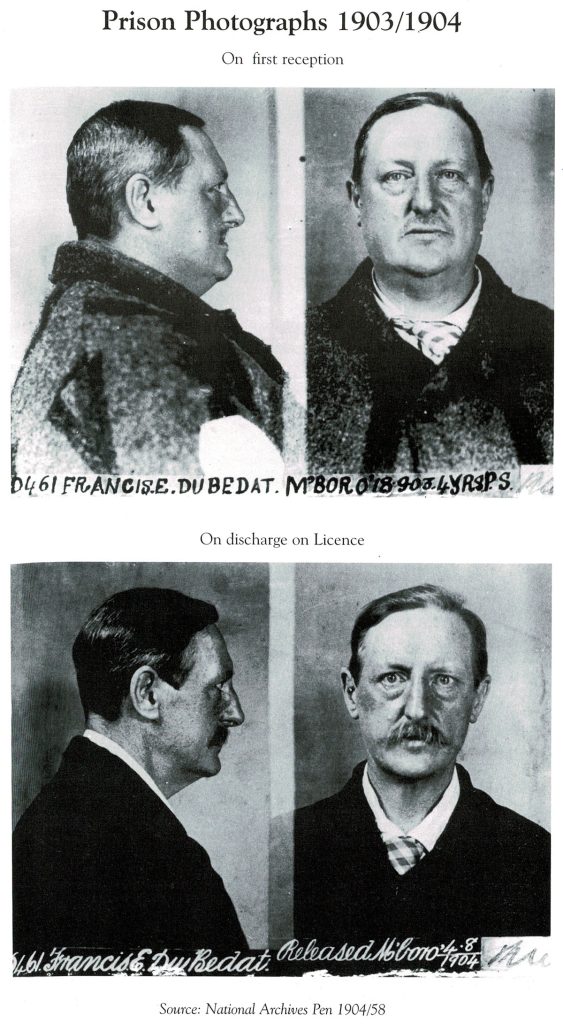
Epilogue – George Bernard Shaw
George Bernard Shaw is believed to have immortalised Frank’s true personality in the character of the same name in his play The Doctor’s Dilemma, produced in 1906. He states that ‘Dubedat’ had only two failings: Money and Women. Shaw may well have known Frank personally as they both lived in the Dalkey/Killiney area and Frank was often referred to as ‘The Actor’ by his relatives. Before his conviction, Frank had a base in Paris as he had a fondness for actresses, especially French ones. An actress is said to have accompanied him to South Africa in 1897. He died there sometime during the 1920s.
Frankfort
The house that caused the indirect downfall of the DuBedats still stands in Killiney and has changed little in the last 100 years. For a time it reverted back to the Exham family. The writer Katharine Tynan lived there and William Butler Yeats stayed as her guest. Another period saw it as a John of God’s refuge. For about 30 years it was divided into apartments housing several families. Today, it is once more a family home.
Frank and Rosie – may you both rest in peace.
“Time remembered is grief forgotten” (Swinburne).
DuBedat Family Motto: Sans Tache (without blemish)
I am grateful to Maria Glancy in giving me permission to have her story “The Rise and Fall of the DuBedats of Dublin” published in the Society’s magazine. In my opinion the information contained therein will be of great interest to any historian, but especially to those who take an interest in the Killiney district. Ms Glancy informs me that subsequent to her research in the “DuBedat Story” she has come across further information on Frank Edward DuBedat’s life in South Africa and hopes to write these accounts in due course.
Harry Latham
Killiney
July 1996
Francis Edward DuBedat- The Book
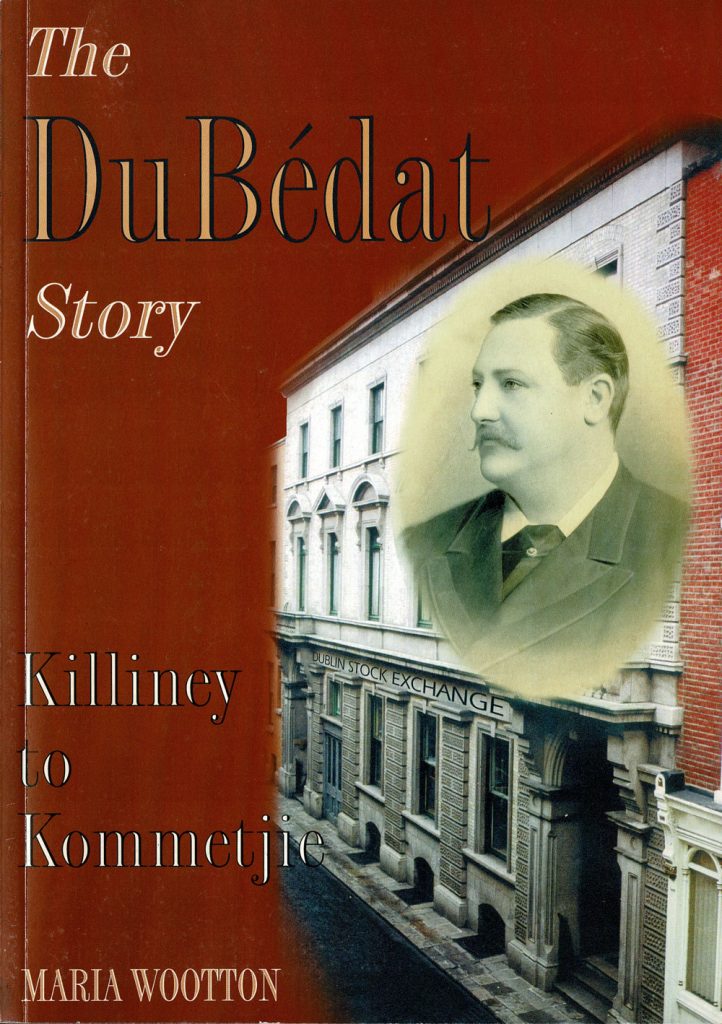
The article from the Dun Laoghaire Borough Historical Society transcribed above led eventually to the publication of a full blown book documenting the history, life and times of Frank Dubedat: The DuBedat Story-Killiney to Kommetjie (1999). Maria Glancy’s (Wootton) piece from 1990 which was published in the DLBHS Journal No. 6 of 1997 covered the period up to his imprisonment in 1891 to his release in 1896. The book goes on to document his life in South Africa after his release until his death there in 1919.
Newspaper cuttings of the time

